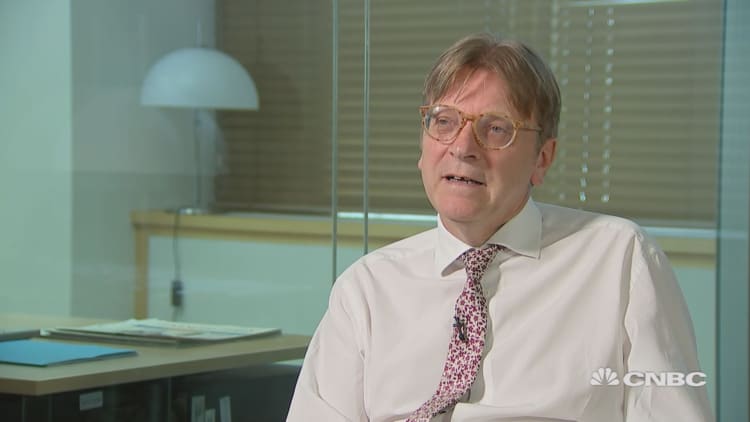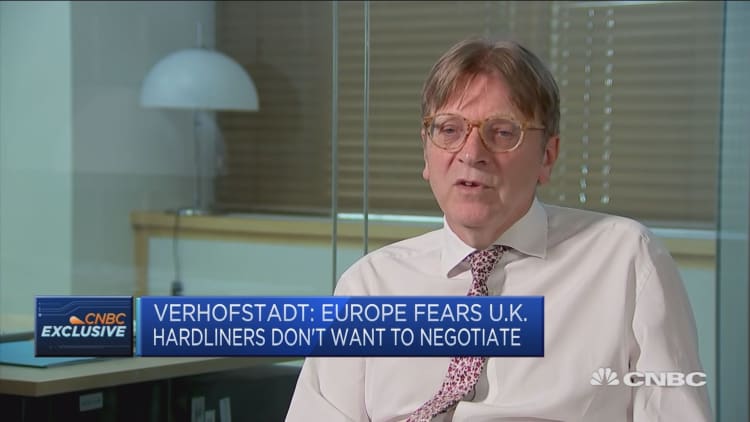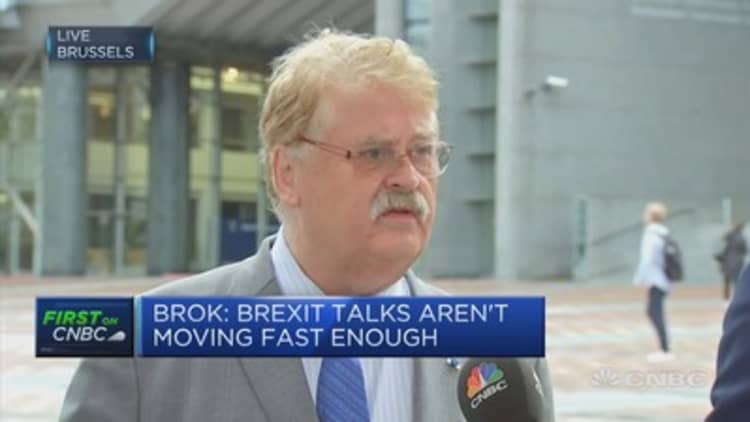
U.K. and EU diplomats are locked in the third round of talks this week in Brussels, but real negotiations have yet to begin, the European Parliament chief for Brexit warned in an exclusive interview with CNBC.
"Let's be honest, I think it's maybe the first round of negotiations," Guy Verhofstadt, who represents the European Parliament in the Brexit process, told CNBC Wednesday about the latest series of formal discussions between the two sides that are due to conclude Thursday.
The U.K. and the EU have already held two rounds of talks in June and July. But according to Verhofstadt, those represented — respectively — an official start to talks and the public presentation of both sides' initial positions.
"I think what we need to do is really to start negotiations and to see how we do this withdrawal; if a transition is needed, making a transition that is not causing economic damage (for either side)," Verhofstadt said, adding that it was only then that both parties should consider their future relationship.
The U.K. had initially pushed for negotiations to focus on its exit and its future relationship with Europe at the same time. But the Europeans have said they want to confirm the technicalities of how the U.K. will leave the bloc, before deciding on the shape of any future cooperation or partnership.
The EU wants to agree first on the U.K.'s financial and budgetary liabilities — the so-called Brexit Bill — as well as finding a mutually agreeable resolution to the issue of the Irish border, and some concrete confirmation of the future rights for EU citizens' living in the U.K.
At the conclusion of the July round of talks, the division between the two sides was obvious, with the EU's leading negotiator Michel Barnier demanding the U.K. clarify its position and what it hoped to achieve in the exit discussions.
Since then the U.K. government has published several position papers but Verhofstadt — like many in Brussels — was largely dismissive of their utility, since "most of them were in fact papers concerning the future relationship between U.K. and the European Union."
And given the substantial differences, he said he was "pessimistic" about this latest series of discussions, especially when it relates to Britain's financial liabilities.
"It's like in a divorce and in a divorce when you go away you don't let all the bills with the rest of the family," Verhofstadt said about the Brexit bill. He suggested that negotiators should agree on a methodology to come up with the figure.
On the issue of European citizens' rights in the U.K., and the reciprocal rights of British passport holders on the continent, Verhofstadt believes the British government's proposal to create entirely new classifications simply adds unnecessary complication.
"In my opinion, what we need to do is not to introduce now a new system for EU citizens living in Britain and then a new status for U.K. citizens living on the continent. What we need to do is agree on a system in which all these people can keep their rights as they have now," the European Parliament member said.

"European democracy, and I think also British democracy, has not been established to diminish the rights of citizens but to protect the rights of citizens," he said, reiterating his often repeated position that the European Parliament will insist negotiating teams must focus on this issue.
"Let's be honest, who is the biggest victim of this whole story? Well, the citizens. The citizens will have problems today." Verhofstadt said the European Parliament has received hundreds of letters from EU and U.K. citizens, complaining about new practices by government authorities on both sides of the English Channel that are making it difficult for them to continue with their current lives.
Transition deal is unavoidable
Verhofstadt agrees with many of the technical experts who have commented on the scale and complexity of these negotiations; the Brexit process will be long and complicated.
"There's a necessity for a transition period because it's impossible in one year and a half (years) not only to discuss and to debate and to negotiate a departure but on top of that also a new relationship. That's not realistic," Verhofstadt said.
And he said that those who think the U.K. will be able to retain EU benefits but not meet its obligations are living in a fantasy land.
"Some people think or dream they could have all the advantages of the European Union, free trade single market, customs union, without any liability, without any inconvenience, no migration no payments, no oversight by the European Court of Justice and full authority on trade," he said.
Brexit is 'dangerously expensive'

Elmar Brok, a German member of the European Parliament, also warned Thursday about the lack of progress in Brexit negotiations.
"It's our common view that it hasn't moved fast enough," Brok told CNBC. "There's not even a proposal from the British side (on the Brexit bill)," he noted.
Without an agreement on the financial settlement, Brexit could be set to hit a deadlock. Only after this issue has been fixed along with the question of citizens' rights and the Irish border, will negotiators be able to focus on trade.
If the deadlock remains and talks don't proceed to the next phase, both sides could find themselves trading with each other under World Trade Organization rules, which means higher tariffs.
It would be a "disaster", Brok said.
"Brexit is dangerously expensive for all of us, but more for Britain because of the size of the internal market," he warned.
—CNBC's Ryan Browne contributed to this report.


